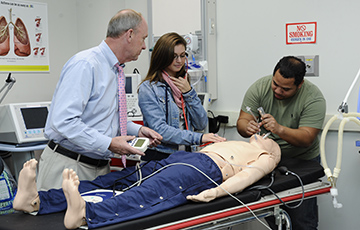Respiratory Therapist Career Guide

Respiratory therapists are responsible for the evaluation and treatment of a patient's lungs and airways. In this article, we will primarily discuss what respiratory therapy is and how to become a respiratory therapist. We will also discuss the average salary of a respiratory therapist and different education paths you can take to start your career, such as an associate's degree in respiratory therapy or a bachelors in respiratory therapy.
What Is Respiratory Therapy?
How to Become a Respiratory Therapist
Respiratory Therapist Salary
How Long Does it Take to Become a Respiratory Therapist?
What Does a Respiratory Therapist Do?
Types of Respiratory Care Degrees
Education Requirements and Prerequisites
What Conditions do Respiratory Therapists Treat?
Where do Respiratory Therapists Work?
What Is Respiratory Therapy?
Respiratory therapy is the practice of examining patients who are experiencing issues with their breathing. A respiratory therapist is responsible for performing chest exams and creating a treatment plan to resolve problems and illnesses within the lungs. Diagnosing lung disease and breathing disorders are the main priority for respiratory therapists, as well as managing breathing equipment and evaluating blood oxygen levels.
An Respiratory Care Expert Explains
Below, GMercyU's Respiratory Care Program Coordinator Randy Solly MS, RRT, RPFT, AE-C gives an overview of respiratory therapy and why it makes a great career path.
How to Become a Respiratory Therapist
Follow these steps to become a respiratory therapist:
Complete Your Degree in Respiratory Care
 The first step in how to become a respiratory therapist is to complete a degree in respiratory care. To provide the best career opportunities, you should consider successfully completing the coursework required in a bachelor’s degree program in respiratory care. The bachelor’s degree curriculum generally includes coursework in clinical respiratory care, procedures, pharmacology, pathophysiology, mechanical ventilation, and advanced respiratory theory.
The first step in how to become a respiratory therapist is to complete a degree in respiratory care. To provide the best career opportunities, you should consider successfully completing the coursework required in a bachelor’s degree program in respiratory care. The bachelor’s degree curriculum generally includes coursework in clinical respiratory care, procedures, pharmacology, pathophysiology, mechanical ventilation, and advanced respiratory theory.
Many programs require a competency assessment that demonstrates the attainment of skills and characteristics required for success in the respiratory care field. In addition, you will be required to complete clinical hours to acquire practical experience in this important medical field.
Selecting a university program that has been accredited by the Commission on Accreditation of Respiratory Care will ensure the widest range of opportunities for you once you've completed your respiratory therapist education. After graduation, respiratory therapists are qualified to work as bedside clinicians, patient educators and advocates, pulmonary rehabilitation specialists, neonatal/pediatric/adult critical care specialists and in management positions in hospitals and alternative care sites.
Keep in mind that continuing education is often required to ensure the ongoing competency and quality of care for patients seeking treatment for breathing issues in the medical environment.
Pass the Credentialing Examinations
Becoming a Certified Respiratory Therapist is usually the next step on your journey in how to become a respiratory therapist. The National Board for Respiratory Care (NBRC) is responsible for administering the examination required to achieve this certification. This multiple-choice test measures your general knowledge and offers pathways to entry-level and advanced-level credentialing:
- You will first take the NBRC Therapist Multiple Choice Examination, and upon passing at the lower cut score level, will be awarded the entry-level Certified Respiratory Therapist (CRT) credential.
- Passing the Multiple Choice Examination at the upper cut score level will allow you to sit the Clinical Simulation Examination.
- After successfully passing the Clinical Simulation Examination, you will be awarded the Registered Respiratory Therapist (RRT) credential, which is the highest level credential of professional practice in this field.
While each of the above credentials can be used to demonstrate eligibility for licensure, the Registered Respiratory Therapist credential is clearly required for higher-level positions in the medical field.
Apply for and Obtain a State License
Every state in the U.S. except for Alaska requires licensure for respiratory care practitioners. Students must have completed at least an associates degree to qualify for licensure in these 49 states. Most states require background checks for licensure applicants; some also offer trainee licenses for students in an accredited respiratory care program.
Start Your Job Search!
While beginning the respiratory therapy job search may seem daunting, we have some tips to better prepare you to land your first job in the field. Building your resume should be a top priority before you interview for any available positions. Be sure to include any accomplishments you received in school, clinical experience, or volunteer work you have done in your community in your resume. You should also practice interviewing so that you are prepared to answer any questions about your experience or knowledge about respiratory therapy.
Respiratory Therapist Salary
Respiratory therapy has become an increasingly popular field and is expected to see an increase in job growth of 13% by the year 2032, more than four times the national average. With the increase in knowledge about healthcare and the desire to prevent disease, it's no wonder why this field is in such demand. People are living longer than ever before and may require more breathing help as they age. Issues regarding sleep, such as sleep apnea, are on the rise and need the assistance of respiratory therapists to manage and treat their conditions.
The average salary for a respiratory therapist is $70,540, according to the Bureau of Labor Statistics.
| Respiratory Therapy Industries | Average Salary |
| Hospitals; state, local, and private | $72,010 |
| Nursing care facilities | $66,040 |
| Offices of physicians | $64,690 |
How Long Does It Take to Become a Respiratory Therapist?
 The process of how to become a respiratory therapist takes a minimum of two years if you obtain your associates degree. However, many employers favor candidates who have a bachelor’s degree in the field, which takes about four years to complete.
The process of how to become a respiratory therapist takes a minimum of two years if you obtain your associates degree. However, many employers favor candidates who have a bachelor’s degree in the field, which takes about four years to complete.
Hands-on clinical experience is also required to become a licensed respiratory therapist. After completing all respiratory therapist education requirements, including laboratory, simulation and clinical experiences in the hospitals, aspiring therapists must also pass a credentialing examination and acquire a license to practice in their home state.
So just how long does it take to be a respiratory therapist? The entire process may take up to four years from start to finish, if you pursue your Bachelor of Health Science in Respiratory Care degree, from completing your education and becoming licensed. Respiratory therapy is a rewarding career with high demand in the healthcare field.
What Does a Respiratory Therapist Do?
Becoming a respiratory therapist provides opportunities to make a positive difference in the lives of those with breathing problems and enjoy the benefits of an in-demand career in the medical field. According to the Bureau of Labor Statistics, as a respiratory therapist you will provide a number of services for patients with breathing difficulties, including the following:
- Measure lung capacity to determine a patient’s condition
- Educate patients about their conditions and the proper use of therapeutic equipment
- Provide basic treatments for diseases such as asthma, emphysema, and COPD
- Take notes and keep records of patients’ treatments and prognoses
- Serve as a member of the Code Team in performing basic and advanced cardiopulmonary resuscitation
- Initiate mechanical ventilation and maintain life support
- Assist doctors in creating and monitoring treatment plans
Respiratory therapy is a rewarding career, but you also need to understand that it is fast-paced, physically enduring, and often requires you to carry a beeper and respond to emergencies in the emergency department, ventilator alarms in the intensive care unit, or codes throughout the hospital.
Types of Respiratory Care Careers
There are various careers and areas of specialization you can pursue.
| Respiratory Therapy Careers | Areas of Specialization |
| Clinician | Medical / surgical care |
| Diagnostician | Adult critical care |
| Adult critical care specialist | Neonatal |
| Pulmonary function technologist | Pediatrics |
| Sleep techologist | Pulmonary diagnostics |
| Asthma educator | |
| ... and more! |
Education Requirements and Prerequisites
In order to get a job in respiratory therapy, there are certain education requirements and prerequisites you will have to fulfill to get your degree before you can begin your career. Respiratory therapists need at minimum and associates degree in order to be considered for a position within the field, although more advanced degrees are strongly preferred. A bachelor's degree or master's degree may lead to more job opportunities and growth later in your career. Some prerequisites, such as chemistry, biology, anatomy and physiology courses, may be required before beginning a degree in respiratory therapy. Clinical experiences are typically required for respiratory therapy majors so that they can graduate with real-world experience before entering the workforce.
What Conditions do Respiratory Therapists Treat?
Respiratory therapists seek to help patients who are experiencing issues with their breathing and airways. Some conditions or ailments respiratory therapists treat include:
- Asthma
- Bronchitis
- Cardiac failure
- COPD
- Emphysema
- Lung cancer
- Premature babies
- Sleep apnea
Where Do Respiratory Therapists Work?
Respiratory therapists primarily work in medical facilities, such as hospitals, diagnostic laboratories or doctor's offices. While hospitals are the primary place where respiratory therapists work, there are numerous other locations including:
- Doctor's offices
- Educational institutions
- Hospitals
- Nursing homes
- Patient homes
- Rehabilitation facilities
- Sleep disorder testing centers
GMercyU, Your Pathway to Success
To become a respiratory therapist and qualify for employment in this growing field, you’ll need to complete either an Associates degree in Respiratory Care or a Bachelor of Health Science in Respiratory Care, pass credentialing examinations, and obtain licensure in your state.
At the Frances M. Maguire College of Nursing and Health Professions at Gwynedd Mercy University, we offer pathways to success that can help you achieve your goals of becoming a respiratory therapist. GMercyU's award-winning program is known for developing highly skilled respiratory therapists; in fact, 100% of our graduates land jobs either before or immediately after graduation. Here, you will be taught by accomplished faculty members with decades of experience who are dedicated and committed to your professional growth and development.
Contact our Admissions office today at 800-342-5462 or email admissions@gmercyu.edu to learn more about our associate's and bachelor’s degree programs in the profession of respiratory care. We look forward to the chance to help you achieve your career goals.